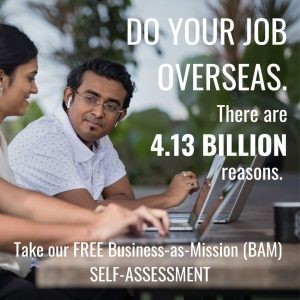“Understand the somewhat different (and evolving) approaches to combining business and mission.”
Many Christians feel God is leading them into a cross-cultural ministry role, but, for any number of reasons, have a sense that “becoming a missionary” is not the path for them.
It’s also helpful to remember that those who identify themselves as missionaries, raise support, and serve through traditional missionary sending organizations often find that their ministry may require or benefit greatly from working a “regular job” in their host community, whether or not they are fully supported by that job.
Longtime “tentmaker” and business-as-mission advocate Patrick Lai provides the following definitions which you may find helpful.
- Worker, or cross-cultural worker: descriptive of someone called to serve Jesus outside of his/her home culture.
- Missionary: someone who is paid or supported by churches and donors to serve God in another culture.
- Tentmaker: a believer who intentionally takes a job with a company or a relief or community development NGO in another culture, is fully supported by that job, and strives to witness cross-culturally.
- Bi-vocational: someone who works two jobs, often one for pay and one as a volunteer worker or supported by donors; not a B4T worker.
- B4T (Business for Transformation): businesses strategically placed in unreached areas designed to create jobs and bless the local community in Jesus’ name; generally through transformation, and specifically through evangelism, discipleship, and church planting. [Also known as transformational business.]
- BAM (Business as Mission): business as mission is a term being used in Christian circles to describe the integration of ministry goals and business goals to make an impact for God’ Kingdom. As a strategy, BAM generally describes any for-profit business endeavor that seeks to reach people and communities for the glory of God and is not artificially supported by donor funds.
Keep in mind that some of these terms may be defined differently by other practitioners or even used interchangeably. It may be helpful to think of B4T as a subset of BAM. It seems that both BAM and B4T workers may have varying levels of reliance on funds given by outside parties. They may raise funds as start-up capital.
Some do not draw a salary from their business as all, while others draw a salary at local levels and raise funds to cover additional expenses. Perspectives on these questions will vary depending on who you talk to in the BAM/B4T community, and as approaches to combining business and mission continue to evolve.
As the above definitions reflect, the broader BAM movement is about much more than just “not having to raise support.”
See also the next answer below entitled “Expect confusion!”
Answer from AskaMissionary staff.
Expect confusion
Missions is changing fast. In fact, in many cases you won’t be called a missionary, even in your own home church. You will be a global worker, or a global partner, or a cross-cultural worker. The internet has introduced a new level of security issues. As you talk to church missions committees, to friends and family, you may have to explain again and again what you are doing if it does not fit a traditional “missionary” model.
Don’t let this turn you off and don’t get upset with those who don’t understand. Be patient. Explain as best you can, and ask them for grace as you learn more. To be honest, NO missionary (cross-cultural worker, global partner…) ever knows exactly what they will do or face when their hit their target country.
You may get asked, “Why are you raising support if you are doing business?” (if you are). While you may at some point be able to self-support yourself in an overseas transformational ministry, there are initial costs like language training and household set-up.
And even when a business is up and running, it may not completely support you as you also raise funds for medical, retirement, schooling for children, etc. Try to help your donors understand that support raised is “total employment package” and not just your “salary.”
Expect confusion. And deal with it as it comes.
Answer from Elizabeth in Michigan, who has served with SEND International all over Asia for 40 years.
“Articles and websites for BAM”
Business as Mission (BAM) :: Business for Transformation (B4T) – https://www.goservelove.net/bam-b4t/
The Best Sites for BAM and B4T information – https://www.goservelove.net/sites-bam-b4t/
Business as Mission articles and papers. A curated list of articles, research, and case studies related to the growing BAM movement.
Recommended by AskaMissionary staff.







